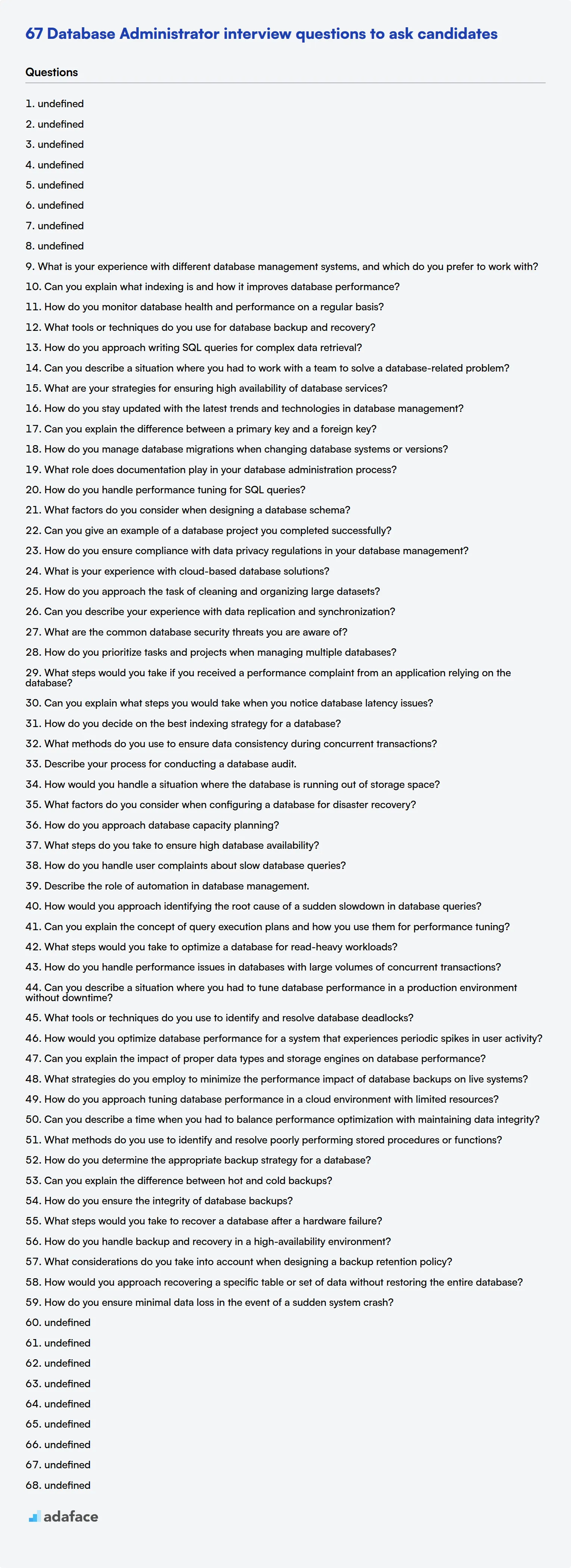Recruitment professionals know the challenge of finding a skilled Database Administrator who can efficiently manage and optimize databases. By utilizing structured interview questions, you can better gauge a candidate’s comprehension and ability in areas like performance tuning and backup recovery, as highlighted in various skills required for database administrators.
This blog post provides a comprehensive guide containing top interview questions categorized into general, junior, intermediate, and performance tuning-specific queries. Whether you're aiming to assess basic technical skills or deeper insights into practical applications, our collection covers all facets to help you make informed hiring decisions.
Using these questions will streamline your interview process and increase the likelihood of identifying top talent. For a more thorough evaluation, complement these questions with a SQL online test to assess candidate skills pre-interview.
Table of contents
8 general Database Administrator interview questions and answers
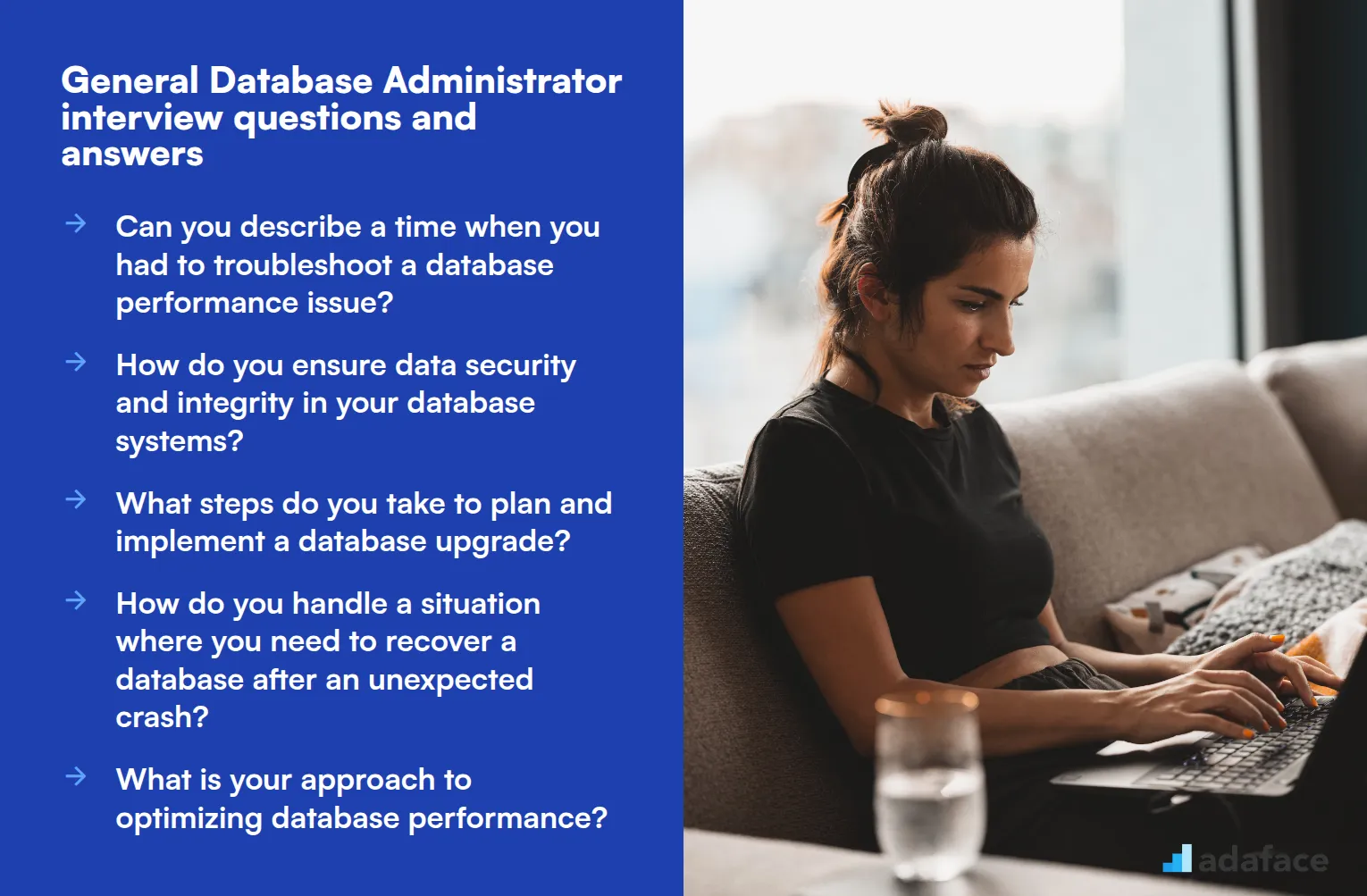
Whether you're navigating the vast ocean of candidates or honing in on a select few, having a handy list of general Database Administrator interview questions can be your compass. This section provides you with insightful queries and ideal responses to help you uncover the true potential of your applicants during interviews.
1. Can you describe a time when you had to troubleshoot a database performance issue?
When faced with a database performance issue, a seasoned Database Administrator would typically begin by identifying the symptoms, such as slow query times or increased error rates. They might use performance monitoring tools to pinpoint the bottleneck, whether it be related to hardware, software, or inefficient queries.
An ideal candidate will not only explain the technical steps they took to resolve the issue but also demonstrate their ability to remain calm under pressure and communicate effectively with stakeholders. Look for answers that include a systematic approach to identifying issues and implementing solutions, as well as a clear explanation of the outcome.
2. How do you ensure data security and integrity in your database systems?
Ensuring data security and integrity involves multiple strategies, including implementing access controls, encrypting sensitive data, and conducting regular audits. A skilled Database Administrator will also set up automated backups and disaster recovery plans to mitigate data loss.
Candidates should provide examples of security protocols they've implemented in the past and discuss the importance of staying updated with the latest security patches and practices. Look for someone who can articulate both the technical and ethical aspects of data security.
3. What steps do you take to plan and implement a database upgrade?
Planning a database upgrade starts with conducting thorough research on the new version's benefits and potential risks. A Database Administrator would then create a detailed plan that includes testing the upgrade in a staging environment, ensuring compatibility with existing applications, and scheduling the upgrade during low-usage periods to minimize disruption.
An ideal response should highlight the candidate’s experience with prior upgrades and their ability to anticipate and manage potential challenges. They should also emphasize the importance of clear communication with their team throughout the process.
4. How do you handle a situation where you need to recover a database after an unexpected crash?
In the event of a database crash, a Database Administrator’s first priority is to assess the extent of the damage and initiate the recovery process using the most recent backups. They might also use transaction logs to restore the database to its last consistent state.
Candidates should highlight their experience with various backup and recovery tools, as well as their ability to remain composed during high-pressure situations. They should also discuss any strategies they use to prevent future crashes, such as setting up monitoring and alerts.
5. What is your approach to optimizing database performance?
Optimizing database performance involves regularly monitoring and analyzing database metrics to identify bottlenecks. A Database Administrator might use indexing, query optimization, and resource allocation adjustments to improve efficiency.
The best candidates will discuss specific tools and techniques they’ve used in the past and provide examples of successful optimizations. They should also highlight their continuous learning mindset and willingness to stay updated with the latest performance optimization trends.
6. How do you handle database user management and access control?
Database user management and access control require setting up roles and permissions that align with the principle of least privilege, ensuring users have only the access necessary to perform their duties. Regular audits and reviews of user access are crucial to maintaining security.
Candidates should provide examples of access control policies they’ve implemented and discuss the importance of balancing security with usability. Look for someone who emphasizes proactive monitoring and quick response to any unauthorized access attempts.
7. Can you explain the importance of normalization and denormalization in database design?
Normalization and denormalization are techniques used to organize data within a database. Normalization reduces redundancy and improves data integrity by dividing data into related tables. However, in certain cases, denormalization can be used to improve performance by reducing the number of joins needed in queries.
An ideal candidate will explain the trade-offs between the two methods and give examples of when they might choose one over the other. Look for someone who can strike a balance between performance and data integrity based on the specific needs of a project.
8. What strategies do you use to handle large data volumes in your databases?
Handling large data volumes requires strategies such as implementing partitioning to distribute data across multiple storage units, using indexing to speed up query processing, and leveraging data compression to save storage space.
Candidates should mention their experience with handling big data and any tools or technologies they’ve utilized. Look for responses that indicate a proactive approach to scaling and maintaining database performance as data volumes grow.
20 Database Administrator interview questions to ask junior administrators
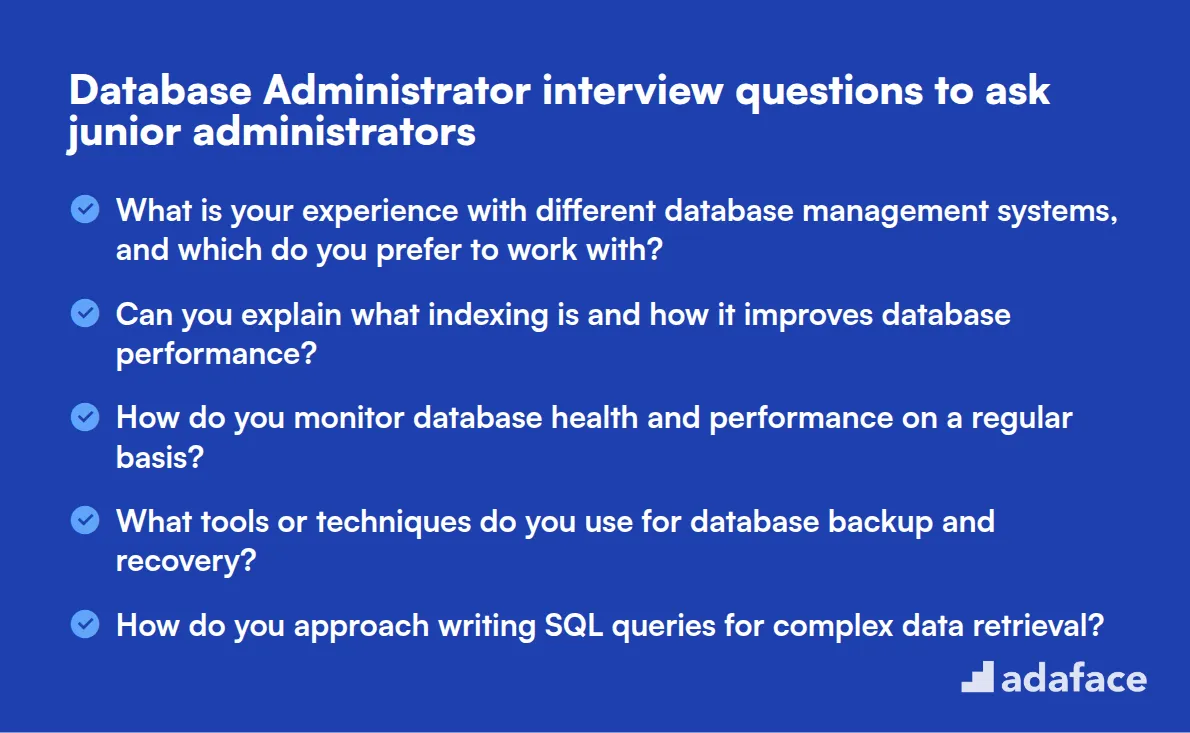
To evaluate a junior database administrator's foundational knowledge and practical skills, consider asking some of these targeted questions. They can help you assess candidates' readiness for the role and their understanding of essential database concepts. For more insights, check out our database administrator job description.
- What is your experience with different database management systems, and which do you prefer to work with?
- Can you explain what indexing is and how it improves database performance?
- How do you monitor database health and performance on a regular basis?
- What tools or techniques do you use for database backup and recovery?
- How do you approach writing SQL queries for complex data retrieval?
- Can you describe a situation where you had to work with a team to solve a database-related problem?
- What are your strategies for ensuring high availability of database services?
- How do you stay updated with the latest trends and technologies in database management?
- Can you explain the difference between a primary key and a foreign key?
- How do you manage database migrations when changing database systems or versions?
- What role does documentation play in your database administration process?
- How do you handle performance tuning for SQL queries?
- What factors do you consider when designing a database schema?
- Can you give an example of a database project you completed successfully?
- How do you ensure compliance with data privacy regulations in your database management?
- What is your experience with cloud-based database solutions?
- How do you approach the task of cleaning and organizing large datasets?
- Can you describe your experience with data replication and synchronization?
- What are the common database security threats you are aware of?
- How do you prioritize tasks and projects when managing multiple databases?
- What steps would you take if you received a performance complaint from an application relying on the database?
10 intermediate Database Administrator interview questions and answers to ask mid-tier administrators.
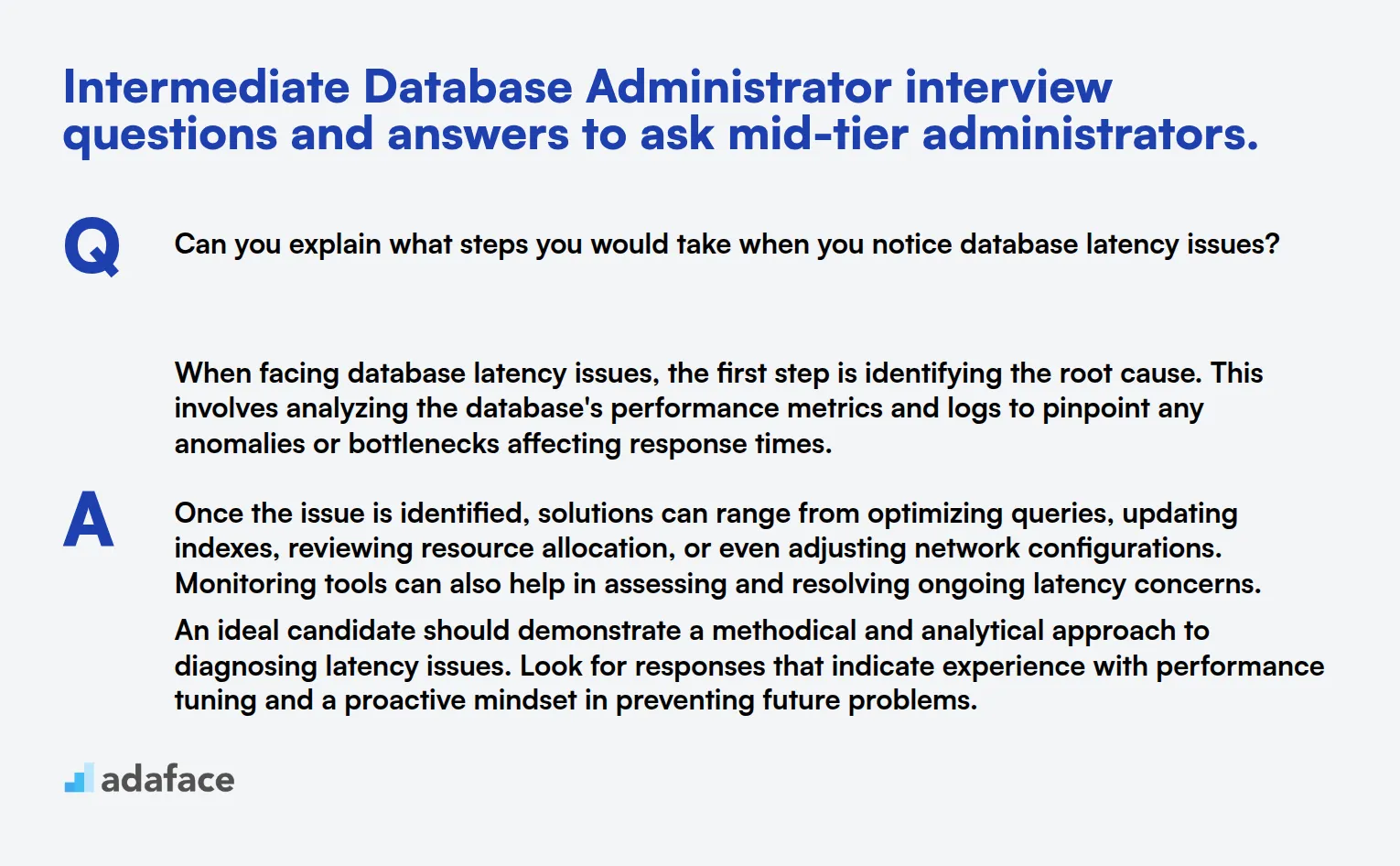
To ensure your mid-tier database administrator candidates are ready to tackle the challenges of the role, dive into this list of intermediate questions. These questions are designed to test their knowledge, problem-solving skills, and adaptability, ensuring they're capable of managing complex database environments with finesse.
1. Can you explain what steps you would take when you notice database latency issues?
When facing database latency issues, the first step is identifying the root cause. This involves analyzing the database's performance metrics and logs to pinpoint any anomalies or bottlenecks affecting response times.
Once the issue is identified, solutions can range from optimizing queries, updating indexes, reviewing resource allocation, or even adjusting network configurations. Monitoring tools can also help in assessing and resolving ongoing latency concerns.
An ideal candidate should demonstrate a methodical and analytical approach to diagnosing latency issues. Look for responses that indicate experience with performance tuning and a proactive mindset in preventing future problems.
2. How do you decide on the best indexing strategy for a database?
Choosing the right indexing strategy requires understanding the specific queries that will be run most frequently. Start by analyzing query patterns and identifying columns that are often used in WHERE clauses, joins, or sorting operations.
Consider using a mix of clustered, non-clustered, and full-text indexes based on the database's needs. Regularly review and adjust the indexing strategy as usage patterns evolve to maintain optimal performance.
Candidates should emphasize the importance of balancing performance gains with potential downsides, such as increased storage use or slower write operations. Look for insights into practical experiences with indexing in various database systems.
3. What methods do you use to ensure data consistency during concurrent transactions?
Data consistency during concurrent transactions can be maintained through isolation levels in the database management system. These levels define how transactions interact with one another, such as by using locks or versioning.
Common strategies include utilizing transaction isolation levels like read uncommitted, read committed, repeatable read, and serializable, depending on the application's consistency requirements and performance considerations.
A strong candidate response will demonstrate an understanding of how different isolation levels impact system performance and data integrity. They should also show familiarity with potential pitfalls, such as deadlocks, and how to mitigate them.
4. Describe your process for conducting a database audit.
Conducting a database audit begins with defining the scope and objectives, determining what needs to be audited and what standards or regulations must be adhered to.
Next, collect and analyze data using logging and monitoring tools to track changes, access, and transaction history. This helps identify any anomalies or unauthorized activities.
Candidates should illustrate a comprehensive understanding of auditing tools and procedures, emphasizing thorough documentation and clear reporting. A proactive approach to identifying potential security vulnerabilities and compliance issues is key.
5. How would you handle a situation where the database is running out of storage space?
In scenarios where a database is approaching its storage limit, it's crucial to act swiftly. Start by identifying opportunities to archive or purge old data that is no longer needed for operational purposes.
Consider adding additional storage resources or increasing the database's capacity using horizontal or vertical scaling techniques. Implementing data compression and optimizing storage settings can also help alleviate space constraints.
An effective candidate should display problem-solving skills and practical knowledge of storage management strategies. Look for experiences where they successfully managed similar situations, ensuring minimal disruption to database operations.
6. What factors do you consider when configuring a database for disaster recovery?
Configuring a database for disaster recovery involves assessing risk levels and setting recovery objectives, such as Recovery Point Objectives (RPO) and Recovery Time Objectives (RTO).
Choose appropriate backup solutions and strategies, like full, incremental, or differential backups, and establish a robust offsite storage practice. Regular testing of recovery procedures ensures readiness in an actual disaster scenario.
Candidates should highlight their understanding of backup technologies and their experience in devising comprehensive disaster recovery plans. The ability to adapt to different organizational needs and technologies is a valuable trait.
7. How do you approach database capacity planning?
Database capacity planning starts with analyzing current usage trends and forecasting future growth. This involves assessing data volume increases, user growth, and application demand.
Based on projections, develop a scalable infrastructure plan that includes hardware upgrades, cloud storage options, or data partitioning strategies. Regularly revisit and adjust the plan to accommodate unforeseen changes.
Candidates should demonstrate an analytical mindset and experience in data-driven decision-making. Look for their ability to communicate capacity needs to stakeholders and plan for both short-term and long-term growth efficiently.
8. What steps do you take to ensure high database availability?
Ensuring high database availability involves implementing redundancy and failover mechanisms, such as clustering, replication, or using distributed database systems.
Regular maintenance, patching, and monitoring are essential to prevent outages. Load balancing and network optimization can also help distribute demand evenly across the system.
Candidates should showcase their experience with high-availability solutions and their proactive approach to minimizing downtime. Look for examples where they successfully maintained system availability, even during unexpected incidents.
9. How do you handle user complaints about slow database queries?
Addressing user complaints about slow queries begins with replicating the issue and analyzing query execution plans to identify inefficiencies.
Consider optimizing queries through indexing, rewriting, or adjusting resource allocation. Engage with users to understand their needs and manage expectations while working on improvements.
An ideal candidate will demonstrate strong communication skills and a collaborative approach, ensuring users are informed and involved throughout the resolution process. Experience with query tuning and performance diagnostics is crucial.
10. Describe the role of automation in database management.
Automation in database management streamlines routine tasks, such as backups, performance monitoring, and resource scaling, reducing the burden on administrators and minimizing human error.
Implementing automation tools and scripts can lead to more efficient processes, freeing up time for strategic tasks. It also enhances system reliability by ensuring consistency and accuracy in repetitive operations.
Look for candidates who have successfully implemented automation in past roles. They should articulate the benefits of automation and demonstrate a balance between automated solutions and the need for manual oversight in critical situations.
12 Database Administrator interview questions about performance tuning

To assess a candidate's expertise in database performance tuning, use these 12 targeted questions. They'll help you gauge the applicant's ability to optimize database operations, identify bottlenecks, and implement effective solutions for peak performance.
- How would you approach identifying the root cause of a sudden slowdown in database queries?
- Can you explain the concept of query execution plans and how you use them for performance tuning?
- What steps would you take to optimize a database for read-heavy workloads?
- How do you handle performance issues in databases with large volumes of concurrent transactions?
- Can you describe a situation where you had to tune database performance in a production environment without downtime?
- What tools or techniques do you use to identify and resolve database deadlocks?
- How would you optimize database performance for a system that experiences periodic spikes in user activity?
- Can you explain the impact of proper data types and storage engines on database performance?
- What strategies do you employ to minimize the performance impact of database backups on live systems?
- How do you approach tuning database performance in a cloud environment with limited resources?
- Can you describe a time when you had to balance performance optimization with maintaining data integrity?
- What methods do you use to identify and resolve poorly performing stored procedures or functions?
8 Database Administrator interview questions and answers related to backup and recovery
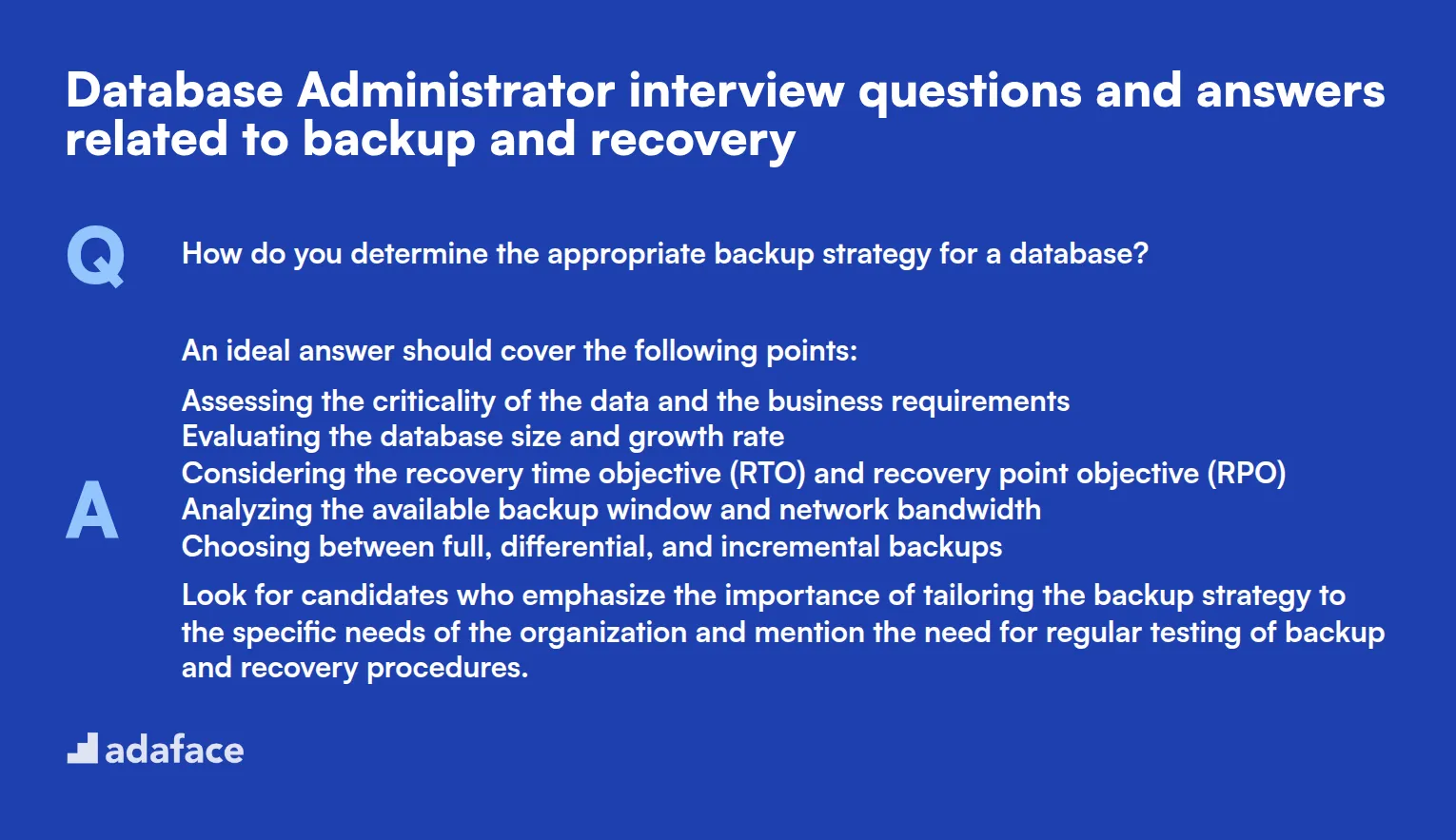
When it comes to database administration, backup and recovery are crucial aspects that can make or break an organization's data integrity. These eight questions will help you assess a candidate's expertise in this critical area. Use them to gauge not just technical knowledge, but also problem-solving skills and real-world experience.
1. How do you determine the appropriate backup strategy for a database?
An ideal answer should cover the following points:
- Assessing the criticality of the data and the business requirements
- Evaluating the database size and growth rate
- Considering the recovery time objective (RTO) and recovery point objective (RPO)
- Analyzing the available backup window and network bandwidth
- Choosing between full, differential, and incremental backups
Look for candidates who emphasize the importance of tailoring the backup strategy to the specific needs of the organization and mention the need for regular testing of backup and recovery procedures.
2. Can you explain the difference between hot and cold backups?
A strong candidate should provide a clear explanation:
- Hot backups: Performed while the database is online and actively serving users. They allow for continuous operation but may impact performance.
- Cold backups: Taken when the database is offline or in a consistent state. They ensure data integrity but require downtime.
The interviewer should listen for mentions of specific scenarios where each type is preferable, such as hot backups for 24/7 operations and cold backups for maintenance windows or smaller, less critical databases.
3. How do you ensure the integrity of database backups?
A comprehensive answer should include:
- Regular verification of backup files through checksums or hash values
- Periodic test restores to ensure backup validity
- Monitoring backup logs for errors or warnings
- Using backup software that includes built-in integrity checks
- Implementing redundancy in backup storage
Look for candidates who emphasize the importance of proactive measures and regular testing in maintaining backup integrity. They should also mention the need for documenting and updating backup verification procedures.
4. What steps would you take to recover a database after a hardware failure?
An experienced DBA should outline a structured approach:
- Assess the extent of the hardware failure and its impact on the database
- Identify the most recent valid backup
- Prepare a new or repaired hardware environment
- Restore the database from the backup
- Apply transaction logs if available to bring the database to the latest possible state
- Verify the restored database for consistency and completeness
- Perform necessary recovery operations (e.g., rolling forward uncommitted transactions)
- Test the recovered database before bringing it online
Pay attention to candidates who mention the importance of having a well-documented disaster recovery plan and emphasize communication with stakeholders throughout the process.
5. How do you handle backup and recovery in a high-availability environment?
A strong answer should cover:
- Implementing redundant backup systems and storage
- Using technologies like log shipping, mirroring, or always-on availability groups
- Configuring automated failover mechanisms
- Regularly testing failover and failback procedures
- Ensuring minimal impact on production performance during backups
Look for candidates who demonstrate knowledge of specific high-availability solutions and can discuss the trade-offs between different approaches. They should also mention the importance of monitoring and maintaining the health of all nodes in the high-availability setup.
6. What considerations do you take into account when designing a backup retention policy?
An ideal response should include:
- Legal and regulatory requirements for data retention
- Business needs for historical data access
- Storage costs and capacity limitations
- Recovery time objectives for different types of data
- Balancing between short-term operational recovery and long-term archival needs
Candidates should demonstrate an understanding of the balance between compliance, cost, and operational efficiency. Look for mentions of tiered storage solutions or data archiving strategies as part of a comprehensive retention policy.
7. How would you approach recovering a specific table or set of data without restoring the entire database?
A knowledgeable candidate might suggest:
- Using table-level or object-level recovery features if available in the DBMS
- Restoring the database to a separate instance and extracting the required data
- Utilizing log sequence numbers or timestamps to recover data to a specific point in time
- Employing third-party tools designed for granular recovery
Look for answers that demonstrate familiarity with the specific capabilities of different database management systems and an understanding of the trade-offs between recovery options in terms of time, resources, and potential data loss.
8. How do you ensure minimal data loss in the event of a sudden system crash?
A comprehensive answer should include:
- Implementing transaction logging and ensuring logs are written to stable storage
- Configuring appropriate checkpoint intervals
- Using write-ahead logging (WAL) mechanisms
- Implementing redundancy through mirroring or replication
- Regularly testing crash recovery procedures
Candidates should demonstrate an understanding of the balance between performance and data safety. Look for mentions of specific DBMS features that aid in crash recovery and the importance of proper configuration to minimize both data loss and recovery time.
9 situational Database Administrator interview questions with answers for hiring top administrators
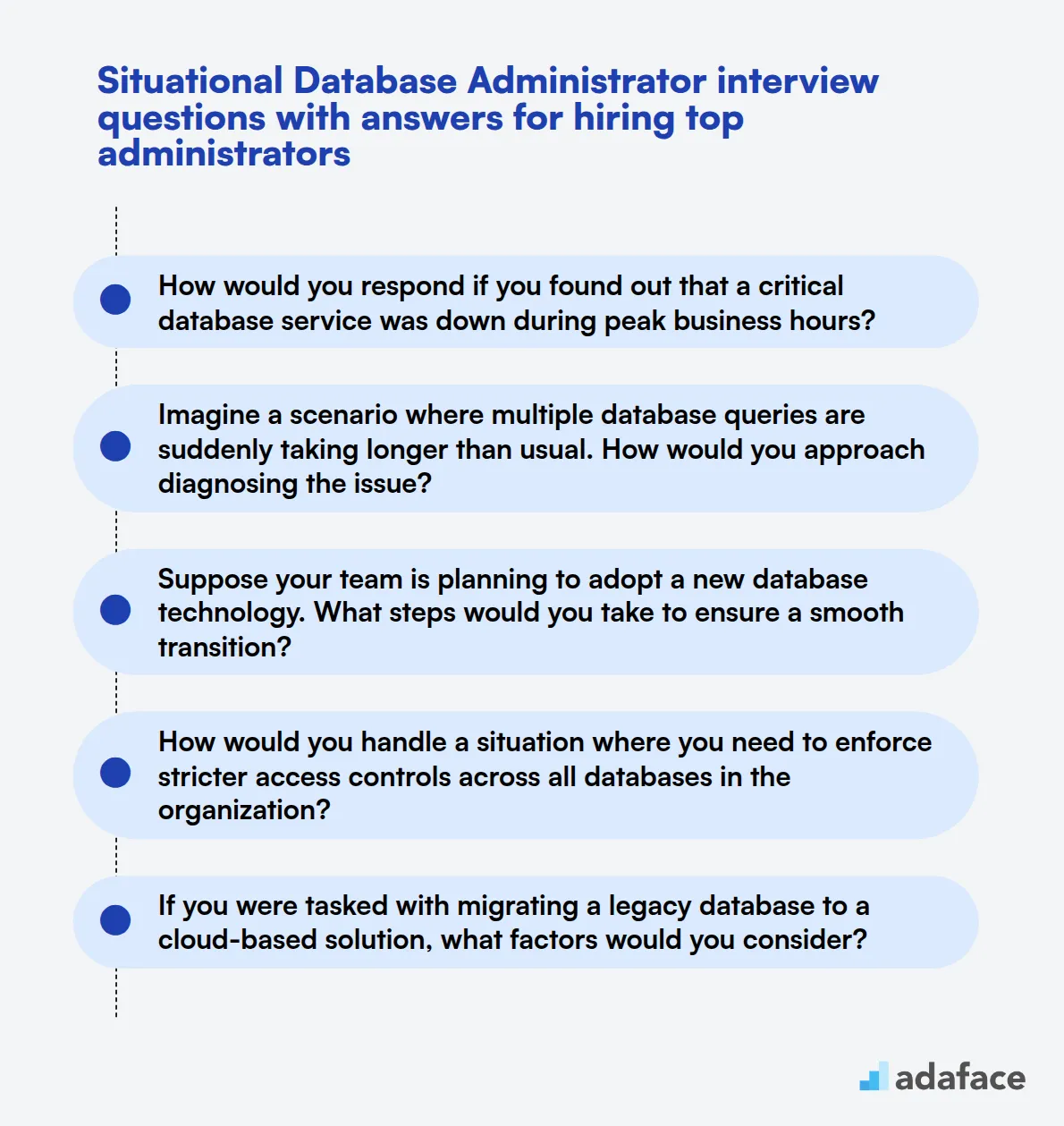
For hiring managers looking to uncover the true potential of their candidates, these situational interview questions for Database Administrators are your secret weapon. Use them to dive deep into applicants' problem-solving abilities and gauge their on-the-job performance skills. They're perfect for interviews where you want to learn how a candidate thinks on their feet.
1. How would you respond if you found out that a critical database service was down during peak business hours?
A Database Administrator should first remain calm and then prioritize communication with the affected teams. They would likely begin by confirming the issue, checking for alerts, and reviewing any recent changes that might have led to the outage.
Next, they would work to identify the root cause, whether it's a hardware failure, software bug, or network issue, and initiate a plan to resolve it quickly. This might include rolling back recent changes or restarting services.
The ideal candidate will mention the importance of timely communication with stakeholders and users, providing updates on the situation and expected resolution times. They should also discuss documenting the incident for future reference and learning.
2. Imagine a scenario where multiple database queries are suddenly taking longer than usual. How would you approach diagnosing the issue?
The first step would likely involve checking for any recent changes or deployments that might have affected the database performance. The candidate should indicate they would examine the database logs for any obvious errors or warnings.
They might also consider the workload on the database at the time, checking for any unusual spikes in traffic or resource usage that could be causing the slowdown.
A strong answer would include using performance monitoring tools to identify bottlenecks and considering longer-term fixes like query optimization or indexing strategies. The candidate should emphasize the importance of a systematic approach to troubleshooting and ensuring minimal impact on users.
3. Suppose your team is planning to adopt a new database technology. What steps would you take to ensure a smooth transition?
Initially, the candidate should mention conducting a thorough analysis of the new technology's compatibility with existing systems and how it aligns with the organization's goals. This includes evaluating the technical requirements and potential benefits.
They would then plan a phased implementation, starting with a pilot project to test the new technology in a controlled environment, ensuring any issues are addressed early on.
Look for candidates who discuss the importance of training team members on the new system and ensuring comprehensive documentation is in place. The ideal response would include a focus on minimizing disruption and ensuring data integrity throughout the transition process.
4. How would you handle a situation where you need to enforce stricter access controls across all databases in the organization?
The first step would be to conduct an audit of current access levels and identify areas where access controls need tightening. The candidate should talk about collaborating with stakeholders to understand the specific requirements and risks involved.
Next, they would design a detailed access control policy that addresses these needs, possibly implementing role-based access control (RBAC) to streamline permissions management.
Strong candidates will discuss the importance of clear communication and training for all affected users, ensuring they understand the changes and how to request access if needed. They should also emphasize the importance of regularly reviewing and updating access controls to maintain security.
5. If you were tasked with migrating a legacy database to a cloud-based solution, what factors would you consider?
Candidates should consider factors such as data volume, data security, and compatibility between the legacy system and the cloud platform. They must also assess the costs and benefits of the migration.
They would likely plan out the migration process in phases, starting with non-critical systems to minimize risk and ensure a smooth transition.
The ideal answer will include the importance of rigorous testing before full deployment and ensuring robust backup solutions are in place. Candidates should also mention the need for post-migration monitoring to quickly identify and resolve any issues.
6. What would you do if you discovered that a routine backup process had failed for several days without detection?
The immediate response would be to investigate the root cause of the failure, whether it was a technical error, configuration issue, or human oversight. Candidates should mention reviewing logs and error messages to pinpoint the problem.
They would also prioritize bringing the backup process back online, possibly by running a manual backup to ensure data is protected while the issue is being resolved.
A strong response would highlight implementing monitoring alerts to prevent future occurrences and reviewing and improving the backup process. Candidates should emphasize the importance of maintaining data integrity and preventing data loss.
7. How would you approach a situation where a new application is causing deadlocks in existing database transactions?
The candidate should start by identifying which transactions are involved in the deadlocks and analyze the application's interaction with the database. They might talk about using database logs and monitoring tools to gather this information.
Next, they would consider optimizing the application's database interactions, possibly by changing the transaction isolation level or modifying the application's logic to reduce lock contention.
Look for candidates who emphasize the importance of collaborating with the application development team to ensure long-term solutions are implemented and that similar issues are avoided in the future.
8. What would you do if you noticed unauthorized access attempts on the database?
The candidate should mention immediately securing the database by identifying and blocking the source of unauthorized access attempts. This may involve tightening firewall rules or revoking compromised credentials.
They would then conduct a forensic analysis to determine the extent of the breach and any potential data compromised. This includes reviewing logs and possibly working with security experts.
An ideal response would emphasize the importance of reporting the incident to relevant stakeholders and implementing measures to prevent future occurrences, such as enhanced access controls and regular security audits.
9. How would you handle a scenario where a database is experiencing frequent connection timeouts?
Candidates should start by investigating the underlying causes, such as network issues, server resource constraints, or configuration errors. They would use monitoring tools to gather data on connection patterns and server performance.
They might also consider optimizing the database configuration to handle more connections or distributing the load across multiple servers to alleviate pressure on a single server.
The ideal candidate will discuss the importance of monitoring improvements and maintaining open communication with application developers to address any persistent issues. They should focus on both immediate fixes and long-term stability.
Which Database Administrator skills should you evaluate during the interview phase?
Evaluating the right skills during a Database Administrator (DBA) interview is crucial, yet it can be challenging to assess every aspect of a candidate's potential in a single meeting. However, by focusing on key competencies, you can better gauge whether a candidate will be able to meet the demands of the role.
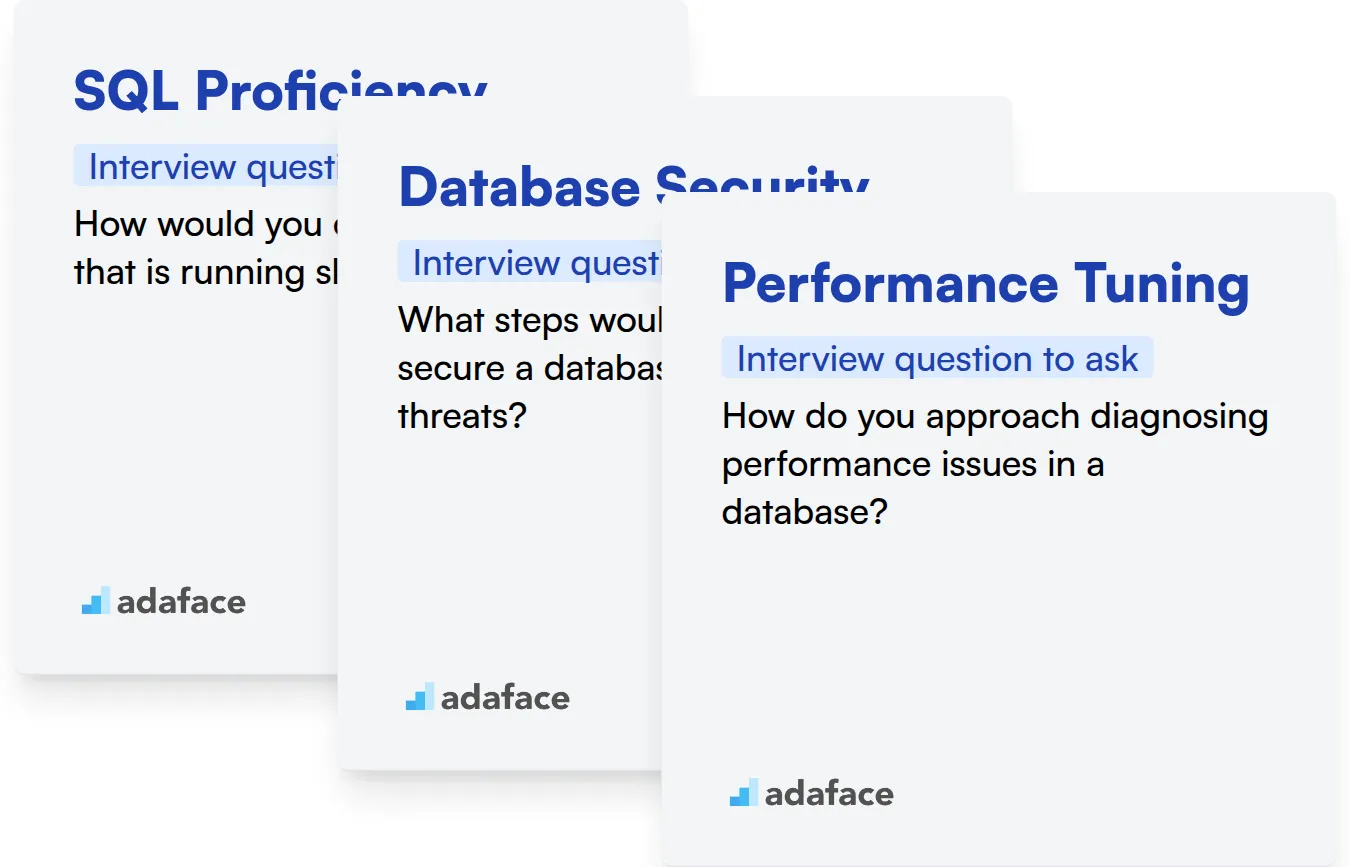
SQL Proficiency
To evaluate a candidate's SQL skills, consider using an assessment test consisting of multiple-choice questions that test their ability to write and optimize SQL queries. Adaface's SQL Test provides a reliable way to assess these skills.
You can also use targeted questions in the interview to get insights into the candidate's SQL capabilities. Here's a specific question you can ask:
How would you optimize a query that is running slowly?
When asking this question, look for responses that demonstrate an understanding of indexing, query structure, and execution plans. A candidate should show an ability to diagnose issues and improve query performance.
Database Security
Consider employing a skills assessment that includes questions on database security practices to identify candidates with the right mindset and skills.
To further probe a candidate's skills in database security, you might consider this question:
What steps would you take to secure a database from potential threats?
Look for thorough and practical answers that include encryption, access controls, and regular audits. The candidate should demonstrate a proactive approach to maintaining data integrity and security.
Performance Tuning
Implementing an assessment with questions on performance tuning can help pinpoint candidates who excel in optimizing database operations.
Performance tuning is another area to explore during interviews. A question you might ask is:
How do you approach diagnosing performance issues in a database?
In the candidate's response, look for a structured approach that includes monitoring system metrics, analyzing slow queries, and applying tuning strategies. The candidate should show analytical skills and a methodical process for enhancing performance.
Hire Top Database Administrators with Skills Tests and Targeted Interview Questions
When hiring a Database Administrator, it's important to verify their skills accurately. This ensures you're bringing on board someone who can handle your database management needs effectively.
A quick and reliable way to assess candidates' database skills is through online tests. Consider using SQL, Oracle PL/SQL, or Data Modeling tests to evaluate their technical expertise.
After shortlisting candidates based on test results, you can invite the top performers for interviews. Use the interview questions provided in this post to dig deeper into their knowledge and experience.
Ready to streamline your Database Administrator hiring process? Sign up for Adaface to access our database skill tests and start identifying the best talent for your team.
SQL Online Test
Download Database Administrator interview questions template in multiple formats
Database Administrator Interview Questions FAQs
A DBA should have strong SQL skills, knowledge of database design, backup and recovery procedures, performance tuning, and security measures.
Ask questions about query optimization, indexing strategies, and their experience with monitoring and improving database performance.
Pose scenarios about database crashes, data corruption, or performance issues to evaluate their problem-solving and decision-making skills.
Focus on their understanding of basic database concepts, willingness to learn, and ability to troubleshoot simple database issues.

40 min skill tests.
No trick questions.
Accurate shortlisting.
We make it easy for you to find the best candidates in your pipeline with a 40 min skills test.
Try for freeRelated posts
Free resources




